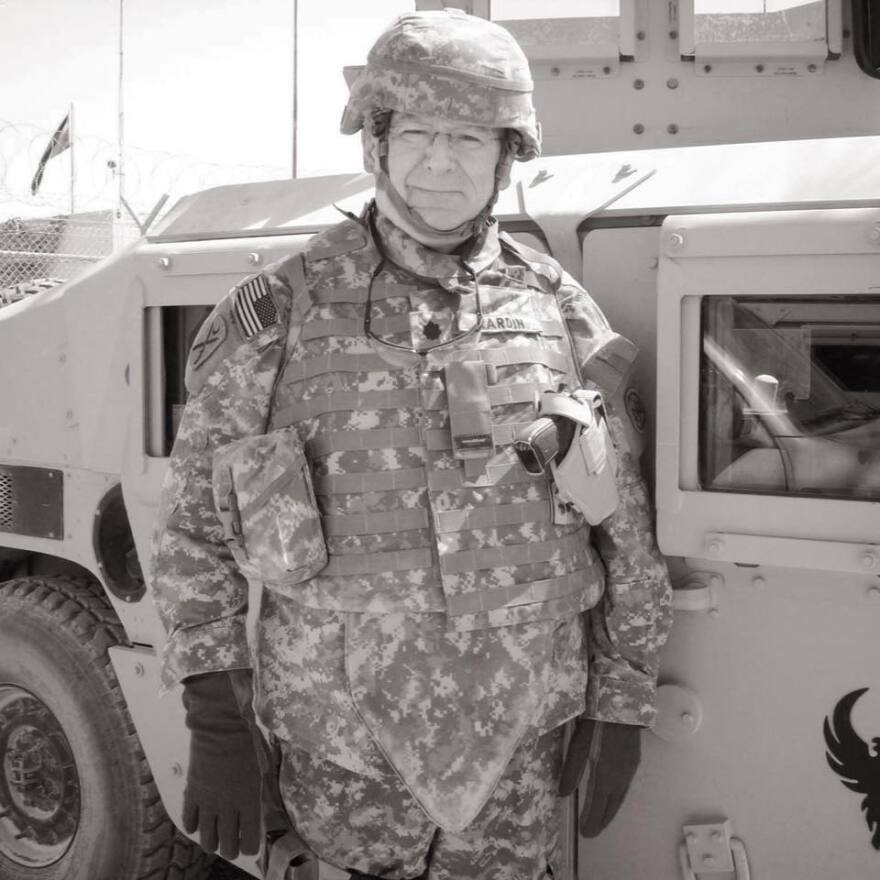During Kevin Rardin’s decades-long legal career, he has worked as both a Shelby County prosecutor and a public defender. But in 2007, he traded the courtroom for a different kind of service.
“I just decided it was my turn to go, so I volunteered for active duty,” he says.
As an Army reservist, he left Memphis for Kandahar, a city in southern Afghanistan. His 12-month assignment included providing legal advice to a U.S. commander and mentoring his counterparts in the Afghan National Army.
That’s where he met “M,” a translator. (WKNO is only identifying him by an initial for his safety).
“We spent a lot of time together,” Rardin says. “We rode in airplanes. We rode in armored convoys. We ate together in the interpreter’s camp.”
It was the foundation for a close bond that Rardin and M still share more than a decade later, staying in touch through email and social media.
“He worked everyday for us, he put his life on the line for us,” says Rardin.
So did thousands of other Afghan nationals. Aiding the U.S. military made many eligible for what’s called a special immigrant visa to resettle in the U.S. But an unknown number of these allies—possibly thousands—did not make it out on evacuation flights before American troops frantically left the country last month in the wake of a takeover by the Taliban.
That included M.
“Their slogan was ‘no one left behind,’ but actually they left us behind,” M tells WKNO via phone from Afghanistan, where he is in hiding with his family, fearing punishment from the Taliban for the 15 years he spent working for foreign troops.
“Please pass our voice to the relevant authority to help us and to take us as soon as possible from Afghanistan because we are not in [a] good situation here,” he says.
It’s a plea that Rardin and other military veterans across the country have been trying to amplify for months. In the lead up to the fall of Kabul, they did what they could back home to pressure the government to expedite visas for their former comrades.
Now, individuals and groups of vets are personally using their networks to try to get them out of the country.
Rardin is part of one helping M. They affectionately refer to one another as uncle and nephew.
“It is a duty and that duty doesn’t have an expiration date on it,” Rardin says. “You just don’t walk away from people who you’ve served with. You just don’t do that.”
Earlier this year, M was on the verge of getting his visa approved. In April, he completed a required interview at the U.S. Embassy in Kabul three years after he first applied. That same day, however, President Biden announced a full troop pullout from Afghanistan no later than Sept. 11.
Facing this fast-approaching deadline, Rardin tried to raise local awareness about the backlog of visa applicants. He penned op-eds, contacted immigration lawyers and wrote to members of Congress.
He also sent money to M to help support him.
M was scheduled for a final step of the visa process, a medical check, on Aug. 19. But the Taliban blazed into the capital four days before that could happen.
He sent Rardin a panicked text message asking, “If they shut down [the] U.S. Embassy [in] Kabul, what will happen to us?”
Rardin’s group of vets used their contacts to try to help M gain access to the Kabul airport’s tarmac, where thousands of other desperate Afghans had flooded hoping for a coveted seat on an evacuation flight.
“We were outside with my family for four nights, nothing happened,” he says.
It was just too crowded and chaotic. M heeded security warnings and left before the suicide bombing on Aug. 26. The veterans directed him to leave Kabul as they coordinated other ways to get him out.
His visa has since been approved. But without a means of transport to another country, he remains in limbo, uncertain how much longer he can afford to hide.
While the State Department says it’s continuing to help at-risk Afghans leave the country, only a limited number of charter flights have taken off since the U.S. exit.
Rardin thinks the government so far has failed its obligation to those who helped make the American mission there possible, leaving veterans and civilians, like himself, to speak out on their behalf.
“If we just leave them there, what does that say about us? Can we be trusted?” he says. “Should any country believe anything we say? Or should they look elsewhere for their friends?”
But more than that, Rardin will keep trying for one simple reason: he says M would do the same for him.



